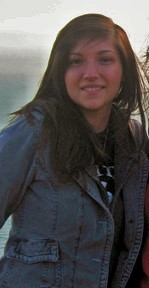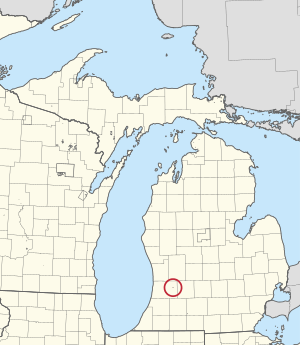Match-e-be-nash-she-wish Band of Pottawatomi Indians of Michigan facts for kids
| Regions with significant populations | |
|---|---|
| Languages | |
| English, Potawatomi | |
| Religion | |
| traditional tribal religion, Christianity | |
| Related ethnic groups | |
| Council of Three Fires (Odawa, Ojibwe, and other Potawatomi tribes) |
The Match-e-be-nash-she-wish Band of Pottawatomi Indians of Michigan is a federally recognized tribe. This means the United States government officially recognizes them. They are a group of Potawatomi people living in Michigan. The tribe is named after a famous Ojibwe chief from the 1800s.
This tribe has had a few different names over time. They were once called the Gun Lake Band of Grand River Ottawa Indians. Other names included the United Nation of Chippewa, Ottawa and Pottawatomi Indians of Michigan, Inc., and simply the Gun Lake Tribe or Gun Lake Band. Their main office is in Bradley, Michigan.
Contents
Tribal History
The ancestors of this tribe were from three different groups. These were the Ojibwe (also called Chippewa), Ottawa, and Potawatomi peoples. They lived around the Great Lakes area. This region is now parts of Canada and the United States.
These tribes often lived in smaller groups called bands. Europeans moving into their lands caused many changes. Many people from these tribes were lost. Some moved west into Minnesota. Others stayed in rural areas of Michigan and Wisconsin.
All these groups spoke Algonquian languages. This is a large language family. It stretches from the Atlantic Coast to the Great Lakes. The tribes also shared some similar cultural traditions. The first members of the Gun Lake Band were survivors from these three tribes. They came together and formed a community near Gun Lake, Michigan.
Becoming a Tribal Member
The tribe's leaders, called the tribal council, set the rules for who can join the tribe. As of 2009, only babies born to current tribal members can become members.
The tribe explains that their members are a mix of Chippewa, Ottawa, and Pottawatomi people. They trace their family history back to a main chief named Match-e-be-nash-she-wish. In 1821, the U.S. government signed a deal with him. This deal, called the Treaty of Chicago, gave him and his followers a special land area. This land was near Kalamazoo, Michigan.
The Match-e-be-nash-she-wish Reservation
The Match-e-be-nash-she-wish Reservation is located in Wayland Township. This is just south of the city of Wayland, Michigan. After the tribe was officially recognized, the government set aside land for them. This land was placed "in trust" for the tribe in 2005. This means the government holds the land for the tribe's benefit.
In 2009, a court case called Carcieri v. Salazar happened. The U.S. Supreme Court made a ruling. They said the government could not take land into trust for tribes recognized after 1934. The Indian Reorganization Act of 1934 was an important law for tribes.
However, in 2014, the U.S. Congress passed a new law. This law was Public Law No: 113-179. It made it clear that the Match-e-be-nash-she-wish Band's land trust was safe. It could not be challenged in court because of the Carcieri v. Salazar decision. This was good news for the tribe.
Tribal Businesses and Culture
The main business run by the tribe is the Gun Lake Casino. The first part of the casino was built in 2009. It is on some of the 147 acres of land the tribe received. This land is in Allegan County, Michigan. The casino created 750 jobs during its construction.
The tribe thought the casino would bring many visitors. They estimated about 60,000 guests each year to local hotels. The tribe did not plan to build their own hotel. They also estimated that the casino would create 600 jobs for people working there.
The tribe also publishes its own newspaper. It is called The Tribal Tribune. They also offer workshops to teach about traditional practices. These workshops help keep their culture alive. Some things taught include:
- Making fire using flint.
- Tapping maple trees for sugar.
- Creating strong ropes from basswood and hemp dogbane plants.
- Playing with snowsnakes, which are long wooden sticks used in a traditional game.
- Making baskets from black ash wood. This is a very old art form among Michigan tribes.
Education
The children living on the reservation attend schools in the Wayland Union Schools district.
Notable Tribal Members

Some important members of the Match-e-be-nash-she-wish Band include:
- Kelly Church: A skilled basket maker, birchbark artist, and painter.
- Match-E-Be-Nash-She-Wish: A significant Potawatomi chief from the 1700s and 1800s.
- Cherish Parrish: A talented basket maker and birchbark artist.
 | George Robert Carruthers |
 | Patricia Bath |
 | Jan Ernst Matzeliger |
 | Alexander Miles |


